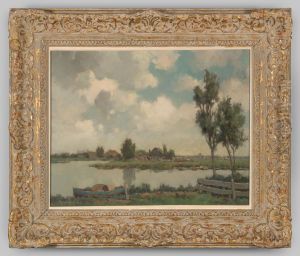Hendrik Jan Wesseling Paintings
Hendrik Jan Wesseling was not primarily known as an artist but as a distinguished Dutch historian and author. Born on August 6, 1937, in The Hague, Netherlands, Wesseling was a prominent figure in European academic circles, particularly in the field of modern European history.
Wesseling's academic career was marked by his deep interest in the history of colonialism and the impact of European imperialism on the world. He studied history at Leiden University and later became a professor there. Over the years, he authored numerous books and articles, contributing significantly to the understanding of European history and colonialism. His work often examined the complex interplay between European powers and their colonies, and he was known for his nuanced and critical approach to historical narrative.
One of Wesseling's most notable contributions to historical scholarship was his book 'Divide and Rule: The Partition of Africa, 1880-1914,' where he explored the partition of Africa by European powers at the end of the 19th century. His ability to contextualize historical events within broader socio-political movements made his work influential among historians and students of European history.
Wesseling also held various administrative positions throughout his career. He served as the rector of the Netherlands Institute for Advanced Study in the Humanities and Social Sciences (NIAS), contributing to the development of interdisciplinary research and fostering a collaborative environment for scholars from around the world.
Despite his focus on history, Wesseling's work intersected with the world of art through his exploration of cultural history and the role of art in the context of European colonialism. His insights into the ways in which art and culture were influenced by and contributed to the colonial project added depth to the understanding of the historical significance of art movements and individual artists during this period.
Hendrik Jan Wesseling passed away on August 30, 2022, leaving behind a legacy as one of the Netherlands' most esteemed historians. His contributions to the field of history have been recognized with several awards and honors, and his scholarly work continues to influence contemporary discussions about Europe's past and its lasting impact on the present-day world.
